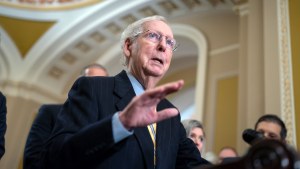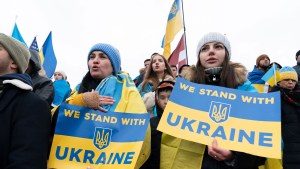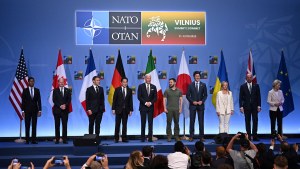However, Republican support for providing US assistance continues to steadily decline.
A joint Chicago Council on Global Affairs / Ipsos survey, conducted February 16–18, 2024, finds that majorities of Americans continue to support the United States providing assistance to Ukraine as well as supporting Ukraine’s admission to NATO. However, opposition among Republicans—both in Congress and among the public—is now chipping away at overall public support for continuing assistance.
Key Findings
- Six in 10 Americans favor providing both economic assistance to Ukraine and sending additional arms and military supplies to the Ukrainian government (58% each).
- Majorities of Democrats (75%) and Independents (54%) favor providing military aid to Ukraine, which a majority of Republicans (53%) oppose.
- Similarly, majorities of Democrats (78%) and Independents (54%) support providing economic assistance to Ukraine, while Republicans are opposed (58%).
- Seven in 10 Americans (69%), including majorities across party lines, favor the United States supporting Ukraine’s admission to NATO.
- A majority of Americans (60%) say that the US security relationship with Ukraine does more to strengthen US national security than it does to weaken it.
Continued Public Support for Economic Aid to Ukraine
Nearly two years since Russia’s invasion of Ukraine in February 2022, a majority of Americans (58%) continue to support the United States providing economic assistance to Ukraine, including eight in 10 Democrats (78%) and a slight majority of Independents (54%). Six in 10 Republicans oppose providing economic assistance to Ukraine (58%, 40% support), marking a slow decline in overall public support for economic aid to Ukraine.
Majority of Americans Favor Sending Additional Arms to Ukraine
Support for providing military aid to Ukraine has followed a similar trajectory. Today, six in 10 Americans (58%) support sending additional arms and military supplies to Ukraine. However, public backing has steadily declined as the war continues. In September 2023, 63 percent supported military aid to Ukraine. At the start of the war in March 2022, 79 percent supported it.
Most of the decline in public support for arming Ukraine stems from Republicans and Independents. Though most Republicans (80%) favored providing arms to Ukraine at the outset of the conflict, support fell steadily throughout 2022. Today, a majority of Republicans (53%) oppose providing Ukraine with additional arms and military supplies (40% support). Independent support for arming Ukraine has also declined from 76 percent in March 2022, but a majority (54%) continue to support it. By contrast, Democratic support for Ukraine has remained stable and high. Today, 75 percent of Democrats support providing arms to Ukraine, similar to Democratic views over the past two years.
Bipartisan Majorities Continue to Support Ukraine’s Admission to NATO; Oppose Sending US Troops to Ukraine
A more popular policy option: supporting Ukraine’s admission to NATO, a step Ukraine has requested and the NATO allies have committed to in the future. Seven in 10 Americans (69%), including majorities of Democrats (83%), Republicans (64%), and Independents (61%) say the United States should support Ukraine’s admission to NATO. Support for admitting Ukraine to NATO among Republicans and Independents has fallen 11 percentage points since the outset of the war, while Democrats’ support has remained steadily high.
Ukraine’s NATO membership would also oblige the United States to defend Ukraine under NATO’s Article 5, which holds that an attack on one member will be considered an attack against all members of the alliance. Yet the notion of sending US forces to aid Ukraine has never garnered much public support. Today, only 28 percent of Americans favor sending US troops to Ukraine to help the Ukrainian government defend itself against Russia, including a third or less of Democrats (35%), Independents (26%), and Republicans (21%).
Given the disparity between high public support for Ukraine’s NATO admission and low support for sending US troops to Ukraine, as well as the greater level of support for NATO membership than for providing Ukraine with arms, it seems likely that the public does not fully understand the commitments the United States would be making as part of Ukraine’s admission to NATO. To be fair to the public, however, policymakers in the United States and Europe alike have embraced a similar set of policies: committing to Ukraine’s NATO admission while opposing any direct involvement in the ongoing Ukraine-Russia war.
For many Americans, Ukraine is already a benefit to US security: six in 10 Americans (60%) say that the US security relationship strengthens US national security. This includes more than three-quarters of Democrats (77%) and over half of Independents (55%). Republicans are divided, with similar proportions saying the relationship does more to strengthen (47%) and more to weaken (46%) US national security.
This analysis is based on data from a joint Chicago Council on Global Affairs / Ipsos survey. It was conducted February 16-18, 2024 by Ipsos using its large-scale, nationwide, online research panel, KnowledgePanel, among a weighted national sample of 1,039 adults 18 or older living in all 50 US states and the District of Columbia. The margin of sampling error for the full sample is ±3.2 percentage points including a design effect of 1.09. The margin of error is higher for partisan subgroups. The data for the total sample were weighted to adjust for gender by age, race/ethnicity, education, Census region, metropolitan status, and household income using demographic benchmarks from the 2023 March Supplement of the Current Population Survey (CPS). Specific categories used were:
- Gender (Male, Female) by Age (18–29, 30–44, 45-59 and 60+)
- Race/Hispanic Ethnicity (White Non-Hispanic, Black Non-Hispanic, Other, Non-Hispanic, Hispanic, 2+ Races, Non-Hispanic)
- Education (Less than High School, High School, Some College, Bachelor or higher)
- Census Region (Northeast, Midwest, South, West)
- Metropolitan status (Metro, non-Metro)
- Household Income (Under $25,000, $25,000-$49,999, $50,000-$74,999, $75,000-$99,999, $100,000-$149,999, $150,000+)




Related Content
 US Foreign Policy
US Foreign Policy
Republicans with a somewhat favorable or unfavorable view of the former president are more likely to say US assistance to Kyiv has been worth the cost.
 US Foreign Policy
US Foreign Policy
Six in 10 continue to support providing economic aid and sending additional arms and military supplies to the Ukrainian government, down slightly from a year ago.
 US Foreign Policy
US Foreign Policy
Republicans with a very favorable view of the former president seem to prefer a US role that is more independent and less cooperative.
 Public Opinion
Public Opinion
As the war in Ukraine continues, majorities say the United States should maintain or increase its commitment to NATO.

